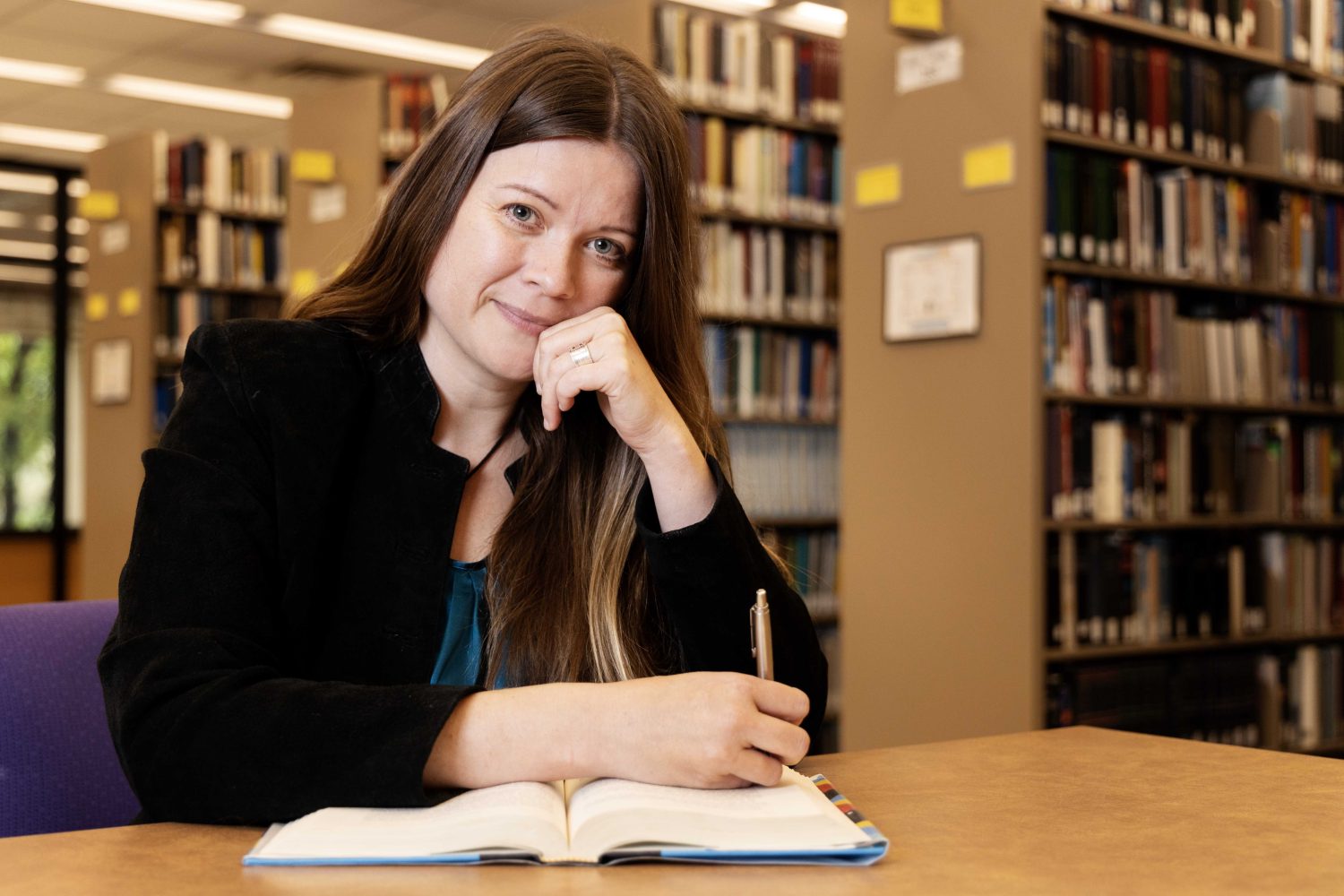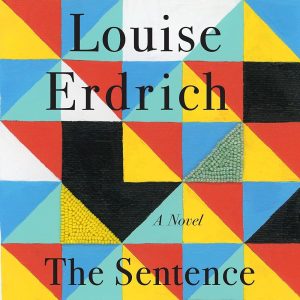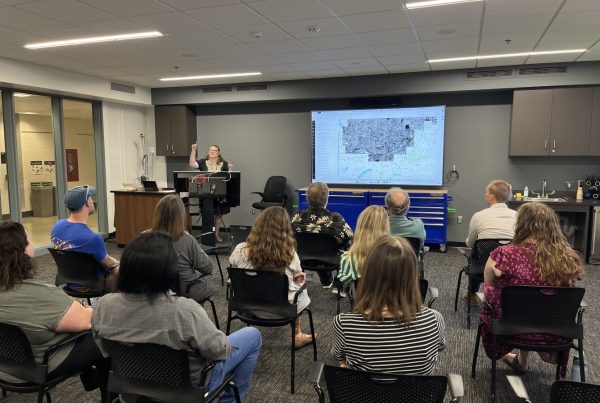
kalan Knudson Davis poses for a portrait on Thursday, Oct. 5, 2023. Davis is the creator of the Minnesota Goddamn project, which seeks to record memories of 2020 in the margins of Louise Erdrich’s “The Sentence.” (Photo/Adria Carpenter)
In late 2021, kalan Knudson Davis, a rare and special collections metadata librarian, tore through Louise Erdrich’s “The Sentence,” an account of Minneapolis from the year prior. Everyone was reading it. Neighbors, coworkers, and strangers would strike up conversations about the book, each with a story about how it resonated with them.
The novel is set in a small independent bookstore in Minneapolis from November 2019 to November 2020 that’s haunted by the store’s most annoying customer. Tookie, a bookseller, tries to solve the haunting while surviving the year.
Erdrich’s semi-autobiographical book is an accurate and intimate depiction of the COVID-19 pandemic and the 2020 Minneapolis uprisings following George Floyd’s murder. Erdrich herself lives in Minneapolis and owns Birchbark Books in the Kenwood neighborhood.
“The pages of a book are a time machine. They have the ability to transport words, stories, and reflections from today to 600 years from now.”
—kalan Knudson Davis.
Reading the book was intense for Davis, leaving a strange and uncanny aftertaste. Like the Tuesday after Floyd’s murder Davis was planting tomatoes in their garden when protestors marched past their house with signs and umbrellas.
It was raining heavily, and Davis was up to their elbows in mud and muck. Davis learned about the murder at that moment.
“And then in the book, it was raining that night,” they said. “i’m seeing the community’s outpouring of anger and grief through Tookie’s eyes, but through my own as well. It’s just that many layers.”
As Davis kept reading through “The Sentence,” lifting the pandemic fogginess and blurred time, uncovering memories from 2020 they had forgotten, they started jotting those experiences into the book’s margins. It happened intuitively and naturally, they said. Pages and pages of memories and marginalia, a dialogue between story and reader.
“i needed to save some of that somehow and get it down on paper, so that i could still have those memories for the future. It was a way to preserve,” they said.
Suddenly an idea formed, what if our community collectively wrote down their 2020 experiences in the margins of this book, and kept them at the Libraries as physical evidence for future scholars, students, and generations to come?
Minnesota Goddamn
That thought quickly evolved into “The Minnesota Goddamn Community Press Project,” a unique testament, existing somewhere between fiction and nonfiction, that will form a communal memory.
The project will distribute 50 copies of “The Sentence” to people in the Twin Cities, who will then add their own reflections to the margins. Upon the return of the books, the annotated copies will be transcribed and formed into a collection.
“As a librarian, this is my clever way of getting more people to read ‘The Sentence,’” Davis joked. “It’s one of those books that i wish i could get into the hands of everybody, whether or not they live in Minneapolis.”
The project will uplift voices advocating for transformative justice and community building and make spaces for them on the Libraries’ shelves. Although many oppressive systems remain intact years after Floyd’s murder, Davis hopes the writing process will help some find peace.
“That’s really what i want people to do. i want them to remember,” Davis said.
The 50 annotated copies and the accompanying marginalia compilation will serve as primary sources in classrooms or artbooks in galleries. The annotated copies will be held at the Upper Midwest Literary Archives (UMLA).
“As a rare book cataloger, i record history. i make history accessible to people by describing these materials that have been passed down to us through generations,” Davis said. “And this project gave me the power to really help others find their voice and help them have that voice heard. The pages of a book are a time machine. They have the ability to transport words, stories, and reflections from today to 600 years from now.”
Davis worked on the project as part of the Radical Librarianship Program, which they felt was “amazing.” They left the sessions feeling like a sponge, absorbing more and more information each day. Being surrounded by like-minded librarians who all share a common ethos made them feel more open and inspired. And although the group only had a short time together, the comradery and solidarity is ongoing.
“i was so grateful to be in a room of folks that really i could see eye-to-eye with, that just held those same basic values about uplifting humanity, about uplifting one another,” they said.





